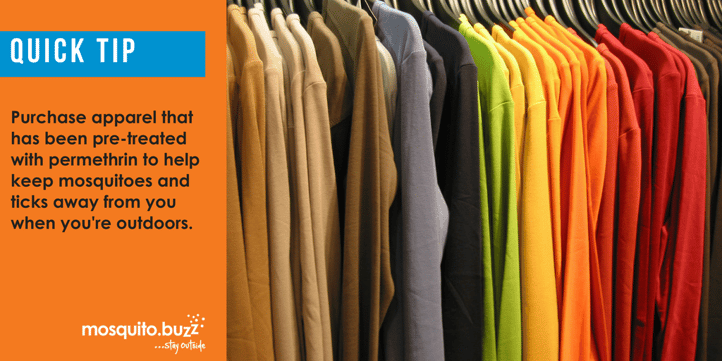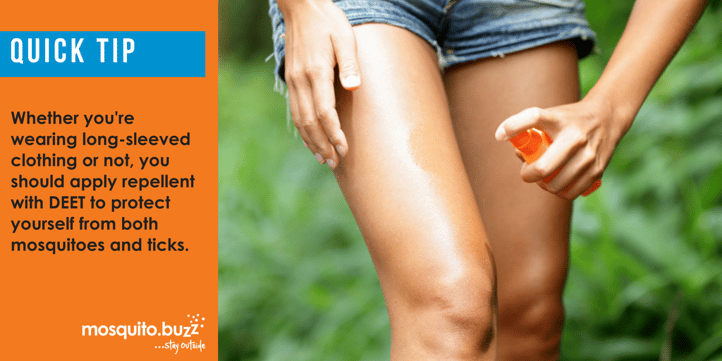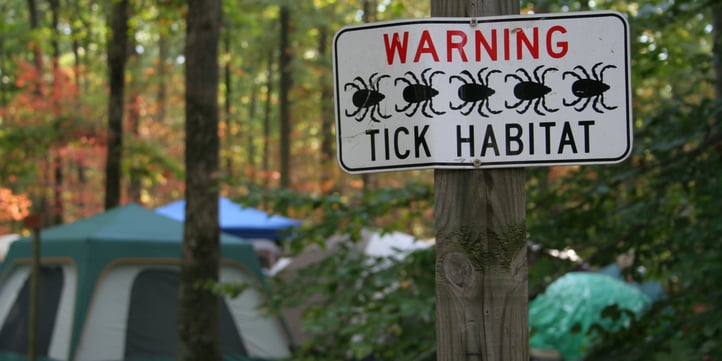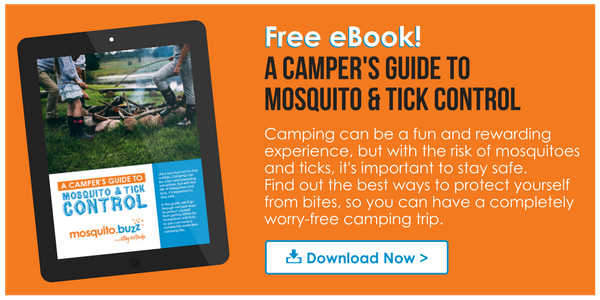
Camping - or glamping, if you're a fancy type - can be a tonne of fun for the whole family. But thanks to biting bugs that have the potential to transmit nasty diseases, camping can be a little risky, too.
But as this decade's most famous Canadian would say; YOLO!
You only live once, so why should you let mosquitoes or ticks ruin your fun? Good news is, you don't have to. But you do have to know how to protect yourself.
Here are our top tips to prevent tick bites and mosquito bites when camping.
Dress For The Occasion
No, we're not suggesting you deck yourself out in camo or khaki. Instead, we're recommending that you wear the right protective clothing to help you avoid mosquito bites or tick bites.
- If you're camping, it's best to wear long sleeved clothing to cover your skin and help protect you from both mosquitoes and ticks. Mosquitoes can bite through tight weave, so a loose fit is a better option.
- Try to choose light colours, too; mosquitoes are more attracted to dark colours like black and blue, so a lighter tone will make you harder for mosquitoes to see. Plus, light colours will make it easier for you to spot a tick that might've landed on you.
- If you're going for a walk, tuck your pants into your socks. You won't win any fashion points, but you will protect your skin in the event a tick latches onto your shoes and crawls up your pants.
- Another handy tip is to treat your clothes with permethrin, or purchase pre-treated clothing that you can use for outdoor adventures. Permethrin is a highly effective insect repellent that works for both ticks and mosquitoes, so when combined with other preventative measures, you should be all set.

Save Your Skin With Repellent
Using repellent is a tried and tested way to protect your skin from bites. But don't just buy anything; make sure you purchase a repellent that has DEET.
Products containing DEET, such as liquids, lotions, and sprays, are designed to be applied directly to the skin. DEET makes it harder for mosquitoes and ticks to smell you, since our lactic acids and carbon dioxide are a good indicator that we're around. DEET confuses their senses, which is why it's so effective.
- Look for products that contain more than 20% of DEET.
- Make sure you read the label and reapply when you need to.
- Don't spray your hands, eyes, nostrils, or lips, and make sure you wash it off once you're in the comfort of an indoor environment.

Be Cautious Of Your Surroundings
If you know what kinds of habitats dangerous insects like to linger in, you'll be better equipped to either take extra precautions like correct clothing and repellent, or avoid those areas entirely.
- Mosquitoes never travel too far from standing water. So if you're near a lake, large puddles, or anywhere containing more than an inch of standing water, mosquitoes could be close by.
- Mosquitoes also tend to wait around in foliage before they pick their targets and go for a blood meal, so it's safe to say they'll be around every corner if you're camping.
- Ticks on the other hand prefer to hang low, in wooded areas or tall grasses. They also dry out quite easily, so the woods give them a moist, shady environment to live in.
- Ticks don't fly like mosquitoes do, and they can't jump, so the only way they'll attach themselves to you is if you brush past something that a tick is waiting around on, at which point they usually crawl upwards. If you're out in the woods, stick to trails and don't get too intimate with grassy or woody areas.

Pick A Safe Spot To Pitch Your Tent
Make sure you pitch your tent in an appropriate location. Now that you know what kinds of habitats mosquitoes and ticks hang around in, you should have a better idea of where not to get cosy for the night. Here's a quick list just in case.
- Don't pitch your tent near a lake or standing water. Mosquitoes breed in standing water, and tend not to travel far.
- Pick a spot with a good breeze. Mosquitoes are weak fliers, so even the slightest breeze will help stop them from approaching you.
- Don't pitch your tent beside tall grasses. Ticks rest on grass blades while waiting for a host.
- Don't pitch your tent next to wood piles. Wood piles provide ticks with a humid, moist, and shady area to rest.
- Don't pitch your tent near moist and shady areas. Choose a sunny area instead.
- Don't pitch your tent near a pile of leaves. Choose a cleared area instead.
It's also a good idea to avoid sitting on the ground, so make sure you bring camping chairs when you're relaxing outside your tent.

Talk To The Campsite
A lot of campsites will treat their grounds with mosquito and tick barrier control, so if you're really concerned about the risk of West Nile Virus or Lyme disease, it's worth doing some of your own research.
Park staff might be able to give you some advice about the best places to camp if you want to avoid ticks or mosquitoes. Equally, some areas are known risk areas for ticks, so it's worth finding out if the spot you're thinking about has a reputation.
Follow us on Facebook for weekly tips and tricks on managing mosquitoes and ticks.



